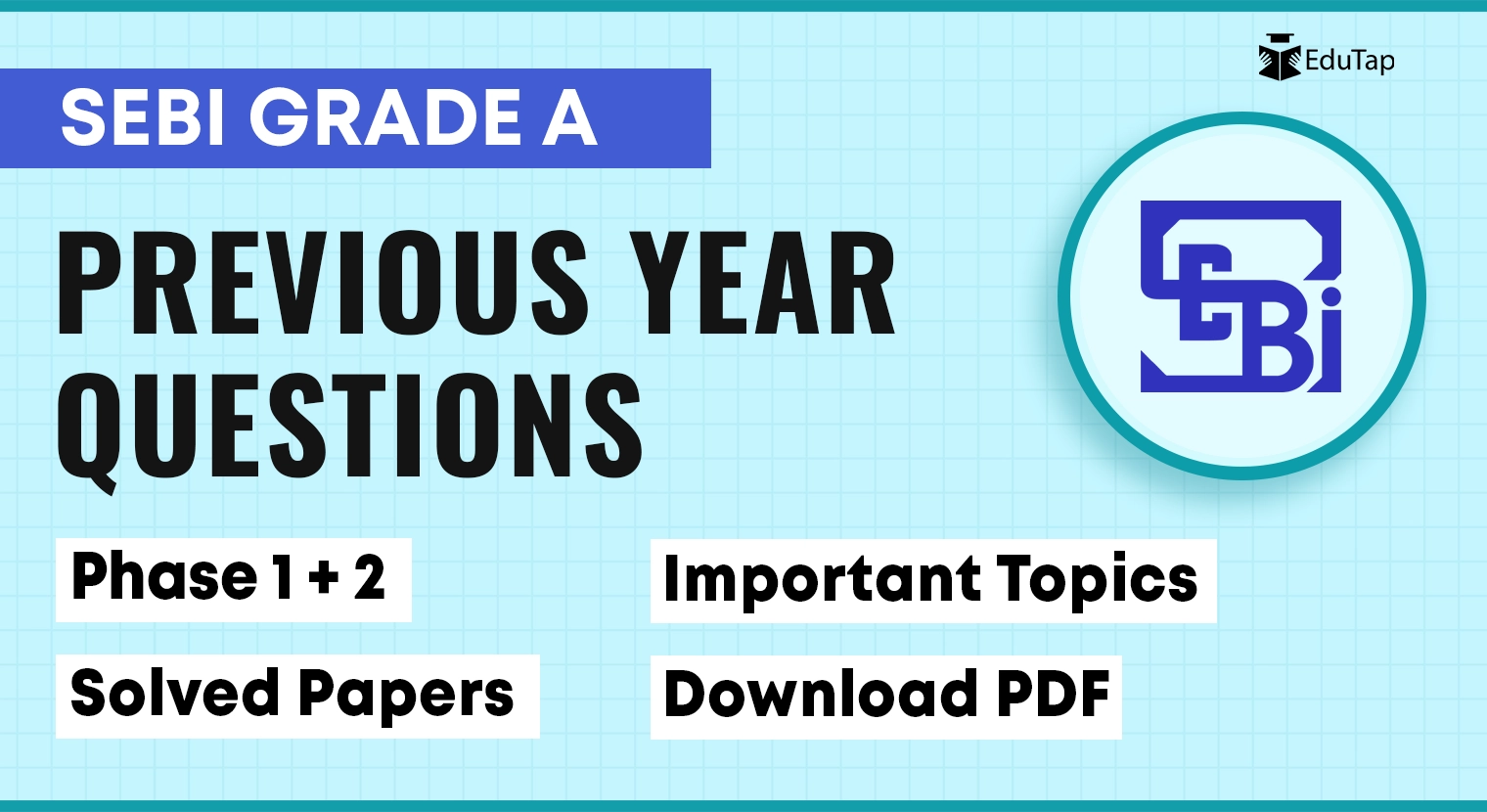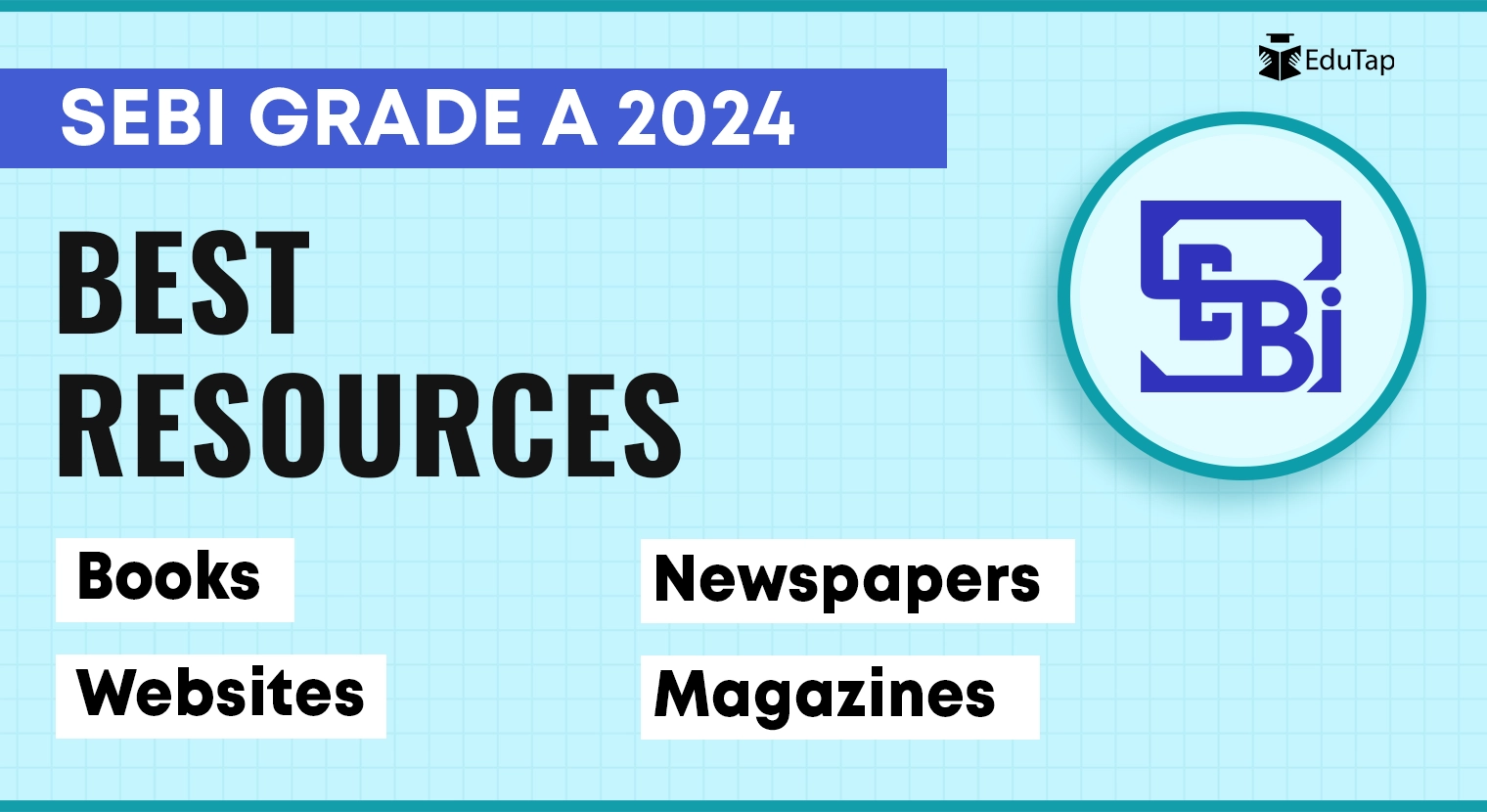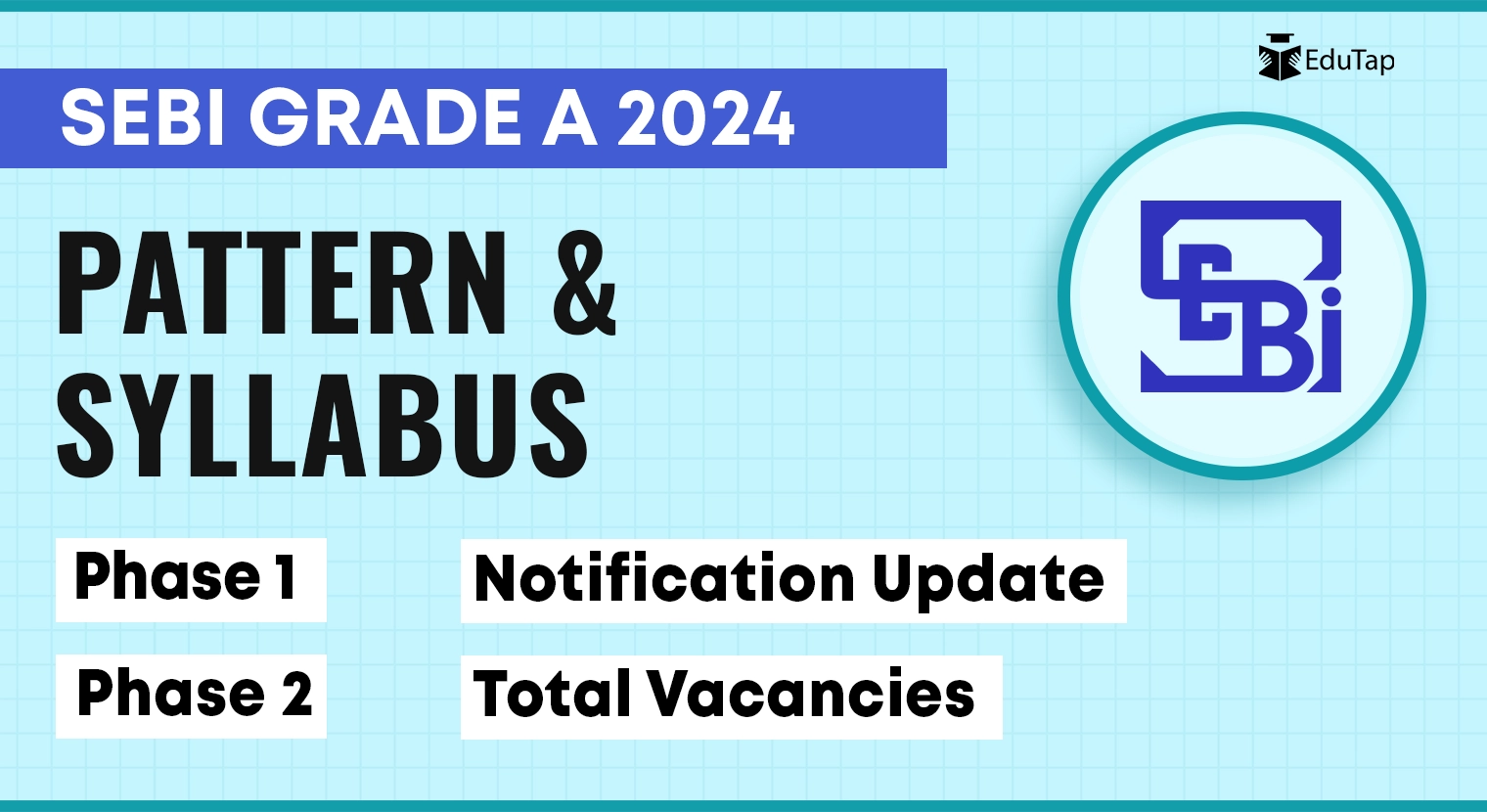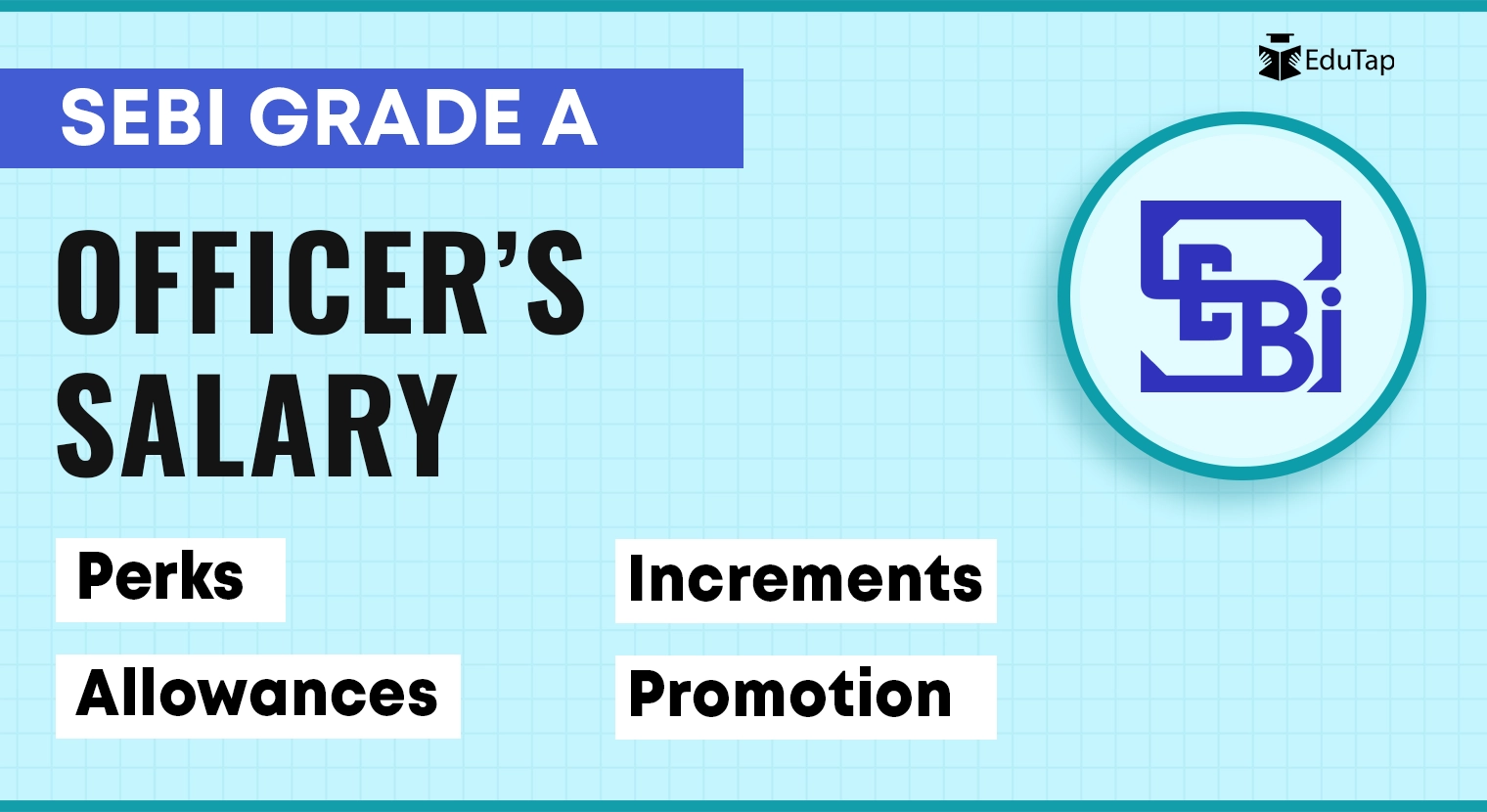The recruitment notification for a SEBI Grade A Officer (Assistant Manager) is usually released for the streams of General, Legal, Information Technology, Research, and Official Language. This article analyses the previous year’s questions for the General stream.
Kindly note that the SEBI Grade A syllabus underwent major changes in 2020. Core subjects, including Securities Market, ESI, and Financial Management, were replaced. This article examines papers from 2020 onwards, aligning with the latest curriculum.
SEBI Grade A Previous Year Questions PDF Download
Access to solved previous year’s questions for SEBI Grade A is a crucial part of your preparation strategy, as they provide insights into types of questions, difficulty level, exam pattern, subject-topic weightage, etc.
SEBI Grade A Phase 1 PYQs PDF Download
Phase 1 is a qualifying online exam consisting of two papers of 100 marks each.
- Paper-I: Multiple choice questions on the subjects viz. General Awareness (including some questions related to the Financial Sector of easy to moderate difficulty level), English Language, Quantitative Aptitude, and Test of Reasoning.
- Paper-II: Multiple choice questions on subjects Commerce, Accounts, Management, Finance, Costing, Companies Act, and Economics
The following table provides links to download solved PYQs for the last few years in PDF format for SEBI Grade A Phase 1.
| Phase 1 Paper 1 | |
| Year | PYQs PDF |
| 2020 | Download PDF |
| 2022 | Download PDF |
| Phase 1 Paper 2 | |
| 2020 | Download PDF |
| 2022 | Download PDF |
SEBI Grade A Phase 2 PYQs PDF Download
Phase 2 is your merit-based online exam consisting of two papers of 100 marks each.
- Paper-I: English (Descriptive Test) to test the drafting skills
- Paper-II: Multiple choice questions on subjects Commerce, Accounts, Management, Finance, Costing, Companies Act, and Economics.
The following table provides links to download solved PYQs for the last few years in PDF format for SEBI Grade A Phase 2.
| Phase 2 Paper 1 | ||
| S.No. | Year | PYQs PDF |
| 1 | 2020 | Download PDF |
| 2 | 2022 | Download PDF |
| Phase 2 Paper 2 | ||
| 3 | 2020 | Download PDF |
| 4 | 2022 | Download PDF |
Now that you have access to solved previous year’s question papers for SEBI Grade A, let’s conduct a subject-wise analysis to understand the exam’s difficulty level and identify important topics.

SEBI Previous Years Questions: Phase 1 Analysis
This section delves into a comprehensive analysis of SEBI Grade A Phase 1 previous year question papers, providing valuable insights into the topic weightage and the overall difficulty level.
Paper 1: General Awareness
Here is the PYQ analysis of General Awareness Phase 1.
| No. Of Questions | |||
| S.No. | Topic | 2022 | 2020 |
| 1 | Static | 3 | 2 |
| 2 | Current Affairs | 17 | 18 |
Paper 1: English Language
Here is the PYQ analysis of English Language Phase 1.
| No. Of Questions | |||
| S.No. | Topic | 2022 | 2020 |
| 1 | Reading Comprehension(Inclusive of Vocabulary) | 10 | 6 |
| 2 | Error Detection | 5 | 6 |
| 3 | Sentence Rearrangement | 5 | 4 |
| 4 | Fillers | 0 | 4 |
Paper 1: Quantitative Aptitude
Here is the PYQ analysis of Quantitative Aptitude Phase 1.
| No. Of Questions | |||
| S.No. | Topic | 2022 | 2020 |
| 1 | Data Interpretation | 9 | 5 |
| 2 | Number Series | 2 | 5 |
| 3 | Quadratic Equation | 3 | 0 |
| 4 | Mixture | 1 | 1 |
| 5 | Time & Distance | 1 | 1 |
| 6 | Boats | 0 | 1 |
| 7 | Time & Work | 1 | 1 |
| 8 | Partnership | 1 | 0 |
| 9 | Percentage | 1 | 1 |
| 10 | Simple Interest | 1 | 0 |
| 11 | Profit and Loss | 0 | 2 |
| 12 | 3D | 0 | 1 |
| 13 | Average | 0 | 1 |
| 14 | Ages | 0 | 1 |
Paper 1: Reasoning
Here is the PYQ analysis of Reasoning Phase 1.
| No. Of Questions | |||
| S.No. | Topic | 2022 | 2020 |
| 1 | Seating Arrangement | 8 | 5 |
| 2 | Puzzles | 8 | 5 |
| 3 | Alphabetical Series | 2 | 0 |
| 4 | Statement Argument | 2 | 0 |
| 5 | Critical Reasoning | 0 | 2 |
| 6 | Directions | 0 | 3 |
| 7 | Syllogism | 0 | 3 |
| 8 | Numerical Series | 0 | 1 |
| 9 | Ranking | 0 | 1 |
Paper 2: Commerce and Accounts
Here is the PYQ analysis of Commerce and Accountancy Phase 1.
| No. Of Questions | |||
| S.No. | Topic | 2022 | 2020 |
| 1 | Accounting as a Financial Information System | 0 | 1 |
| 2 | Income Statement and Balance Sheet | 0 | 2 |
| 3 | Preparation and Presentation of Company Final Accounts | 1 | 1 |
| 4 | Ratio Analysis | 0 | 1 |
| 5 | Introduction to Accounting | 1 | 0 |
| 6 | Accounting Standard for Revenue Recognition | 1 | 0 |
| 7 | Accounting Standard for Property Plant and Equipment | 2 | 0 |
| 8 | Accounting for Buyback of Shares | 1 | 0 |
| 9 | Accounting for Bonus Shares and Right Issue | 1 | 0 |
| 10 | Miscellaneous (Bills of Exchange, Partnership Accounts, Trial Balance and Rectification of Errors, Recording Transactions) | 2 | 5 |
Paper 2: Management
Here is the PYQ analysis of Management Phase 1.
| No. Of Questions | |||
| S.No. | Topic | 2022 | 2020 |
| 1 | Motivation | 1 | 1 |
| 2 | General Management | 3 | 3 |
| 3 | Leadership | 2 | 0 |
| 4 | Communication | 1 | 0 |
| 5 | HRD | 1 | 0 |
Paper 2: Finance
Here is the PYQ analysis of Finance Phase 1.
| No. Of Questions | |||
| S.No. | Topic | 2022 | 2020 |
| 1 | Primary and Secondary Markets – Equity Markets | 0 | 3 |
| 2 | Primary and Secondary Markets – Debt Markets | 0 | 1 |
| 3 | Direct and Indirect Taxes and GST | 0 | 3 |
| 4 | Financial Institutions – RBI, SEBI, NABARD, SIDBI, etc. | 1 | 2 |
| 5 | Direct and Indirect Taxes and GST | 0 | 2 |
| 6 | Banking and Financial System in India | 0 | 1 |
| 7 | Basics of Derivatives (Future, Forwards, & Swaps) | 1 | 1 |
| 8 | Functions of RBI | 1 | 1 |
| 9 | Miscellaneous (IT Act, Income Tax, Mutual Funds, Risk Management, Current Affairs) | 3 | 4 |
Paper 2: Costing
Here is the PYQ analysis of Costing Phase 1.
| No. Of Questions | |||
| S.No. | Topic | 2022 | 2020 |
| 1 | Lean System and Innovation | 6 | 1 |
| 2 | Marginal Costing | 0 | 1 |
| 3 | Overview of Cost and Management Accounting | 2 | 0 |
| 4 | Budgeting | 1 | 0 |
| 5 | Miscellaneous (Labour Costs) | 0 | 1 |
Paper 2: Companies Act
Here is the PYQ analysis of Companies Act Phase 1.
| No. Of Questions | |||
| S.No. | Topic | 2022 | 2020 |
| 1 | Chapter XII: Meeting of Board of Directors | 2 | 0 |
| 2 | Chapter X: Audit and Auditors | 1 | 0 |
| 3 | Chapter XXVII: NCLT and NCLAT | 1 | 0 |
| 4 | Chapter III: Prospectus & Allotment of Securities | 1 | 0 |
| 5 | Chapter IV: Share Capital and Debentures | 1 | 0 |
| 6 | Chapter VIII: Declaration and Payment of Dividend | 1 | 0 |
| 7 | Chapter XI: Appointment of Boards of Directors | 1 | 0 |
| 8 | Miscellaneous (Chapter II, Basics of Company Law, Chapter VI) | 0 | 3 |
Paper 2: Economics
Here is the PYQ analysis of Economics Phase 1.
| No. Of Questions | |||
| S.No. | Topic | 2022 | 2020 |
| 1 | Demand and Supply | 2 | 1 |
| 2 | Market Structure | 1 | 0 |
| 3 | IS-LM Curve | 1 | 0 |
| 4 | National Income | 1 | 0 |
| 5 | Balance of Payment | 1 | 0 |
| 6 | Non-Banking Financial Companies | 2 | 0 |
| 7 | Miscellaneous (Demographic Trends) | 0 | 1 |
SEBI Grade A Phase 1 Difficulty Level
Now let’s look at the difficulty level of the SEBI Grade A Phase 1 exam for the years 2022 and 2020 respectively.
Phase 1 Paper 1 Difficulty Level
The table below provides a breakdown of the easy, moderate, and difficult questions for Phase 1 Paper 1 of the SEBI Grade A exam.
| Subject | Difficulty Level | 2022 | 2020 |
| Quantitative Aptitude | Easy | 15 | 14 |
| Moderate | 5 | 6 | |
| Difficult | 0 | 0 | |
| General Awareness | Easy | 6 | 6 |
| Moderate | 13 | 12 | |
| Difficult | 1 | 2 | |
| Reasoning | Easy | 12 | 15 |
| Moderate | 4 | 5 | |
| Difficult | 4 | 0 |
For the English section, the difficulty level is generally easy to moderate. Candidates can effectively prepare for this subject by expanding their vocabulary and practising through mock tests.
Phase 1 Paper 2 Difficulty Level
Following is the overall breakdown of the difficulty level for the SEBI Grade A Phase 1 Paper 2 for the last few years.
| 2022 | 2020 | |
| Easy | 29 | 33 |
| Moderate | 15 | 11 |
| Difficult | 6 | 6 |

SEBI Previous Years Questions: Phase 2 Analysis
This section delves into a comprehensive analysis of SEBI Grade A Phase 2 previous year question papers, providing valuable insights into the topic weightage and the difficulty level.
Paper 1: Descriptive English
Here is the PYQ analysis of Descriptive English Phase 2.
| No. Of Questions | |||
| SNo. | Section | 2022 | 2020 |
| 1 | Essay | 1 (out of 4 options) | 1 (out of 4 options) |
| 2 | Precis | 1 | 1 |
| 3 | Reading Comprehension | 5 (1 passage) | 5 (1 passage) |
Paper 2: Commerce and Accounts
Here is the PYQ analysis of Commerce and Accountancy Phase 2.
| No. Of Questions | |||
| S.No. | Topic | 2022 | 2020 |
| 1 | Accounting Standard for Property Plant and Equipment | 1 | 1 |
| 2 | Cash Flow Statement | 1 | 2 |
| 3 | Ratio Analysis | 3 | 1 |
| 4 | Accounting for Share Capital | 0 | 1 |
| 5 | Accounting Standard – Foreign Exchange Transactions | 1 | 1 |
| 6 | Accounting Standard of Inventories | 1 | 0 |
| 7 | Preparation and Presentation of Company Final Accounts | 2 | 1 |
Paper 2: Management
Here is the PYQ analysis of Management Phase 2.
| No. Of Questions | |||
| S.No. | Topic | 2022 | 2020 |
| 1 | General Management | 1 | 4 |
| 2 | Leadership | 1 | 2 |
| 3 | Communication | 1 | 2 |
| 4 | Motivation | 2 | 1 |
| 5 | HRD | 1 | 0 |
Paper 2: Finance
Here is the PYQ analysis of Finance Phase 2.
| No. Of Questions | |||
| S.No. | Topic | 2022 | 2020 |
| 1 | Derivatives (Options) | 0 | 1 |
| 2 | GST | 0 | 1 |
| 3 | Derivatives (Futures & Forwards) | 0 | 2 |
| 4 | Primary and Secondary Markets (Debt Markets) | 0 | 2 |
| 5 | Primary and Secondary Markets (Equity Markets) | 0 | 2 |
| 6 | Financial Inclusion | 0 | 1 |
| 7 | Functions of RBI | 1 | 0 |
| 8 | Direct and Indirect Tax | 1 | 0 |
| 9 | Finance Commission | 1 | 0 |
| 10 | Forex Market | 1 | 0 |
| 11 | Miscellaneous (Current Affairs) | 2 | 0 |
Paper 2: Costing
Here is the PYQ analysis of Costing Phase 2.
| No. Of Questions | |||
| S.No. | Topic | 2022 | 2020 |
| 1 | Budget and Budgetary Control | 1 | 2 |
| 2 | Process Costing | 0 | 1 |
| 3 | Marginal Costing | 2 | 1 |
| 4 | Lean System and Innovation | 1 | 2 |
| 5 | Labour Cost | 1 | 0 |
| 6 | Overview of Cost and Management Accounting | 3 | 0 |
| 7 | Miscellaneous (Material Cost, Overhead Cost) | 1 | 3 |
Paper 2: Companies Act
Here is the PYQ analysis of Companies Act Phase 2.
| No. Of Questions | |||
| S.No. | Topic | 2022 | 2020 |
| 1 | Chapter X: Audit and Auditors | 1 | 2 |
| 2 | Chapter III: Prospectus and Allotment of Securities | 1 | 1 |
| 3 | Chapter XXVII: NCLT and NCLAT | 1 | 0 |
| 4 | Chapter XI: Appointment of Directors (Section 149 to 160) | 2 | 0 |
| 5 | Chapter VIII: Declaration and Payment of Dividend | 1 | 0 |
| 6 | Chapter IV: Share Capital and Debentures | 1 | 0 |
| 7 | Chapter XII: Meeting of Board of Directors (Section 172 to 183) | 2 | 0 |
| 8 | Miscellaneous (Section 233A of Companies Act 1956, Chapter XVIII) | 0 | 2 |
Paper 2: Economics
Here is the PYQ analysis of Economics Phase 2.
| No. Of Questions | |||
| S.No. | Topic | 2022 | 2020 |
| 1 | Demand and Supply | 1 | 2 |
| 2 | Inflation and Unemployment | 1 | 1 |
| 3 | Business Cycle | 0 | 1 |
| 4 | Classical and Keynesian Approach to Determination of Output and Employment | 0 | 1 |
| 5 | Union Budget and Fiscal Policy | 2 | 1 |
| 6 | National Income | 1 | 1 |
| 7 | Balance of Payment | 0 | 1 |
| 8 | NBFC | 1 | 0 |
| 9 | Money Supply | 1 | 0 |
| 10 | Phillips Curve | 1 | 0 |
| 11 | Market Structure | 2 | 0 |
| 12 | Elasticity of Demand | 1 | 0 |
SEBI Grade A Phase 2 Difficulty Level
Following is the breakdown of the difficulty level for the SEBI Grade A Phase 2 Paper 2 for the last few years.
| 2022 | 2020 | |
| Easy | 23 | 23 |
| Moderate | 25 | 27 |
| Difficult | 2 | 0 |
Note: The difficulty level for Phase 2 Paper 1 of descriptive English is generally moderate. Candidates can prepare for the same by developing an exam-relevant vocabulary by reading editorials, understanding grammar rules, and practising typing on a keyboard to enhance speed.
SEBI Grade A 2024 Important Topics: Phase 1 & 2
Our list of most important topics is a combination of the given syllabus for Paper 2 and the decoded syllabus for Paper 1 for both phases based on the SEBI Grade A 2022 notification (Pg. 19-20) and an in-depth PYQs’ analysis respectively.
Paper 1 (Phase 1)
General Awareness (Current Affairs + Static): Important Topics
- Banking and Financial Awareness: News, Notifications, & Regulations of RBI, SEBI, PFRDA, IRDAI, Finance Ministry, Union Budget, EconomicSurvey
- National News: MoUs, summits, and major events related to India
- International: Summits and conferences held abroad
- Financial & Economics News
- Defence: Military exercises, drills, and major updates related to the defence sector of India
- Days in News: Major events or days, along with its date, and theme
- Persons in News: Obituaries, appointments, retirements
- Awards and honours
- Books and Authors
- Static GA – Chief Ministers and Cabinet Ministers, National Parks and Sanctuaries, Organisations’ Headquarters, Banks’ Headquarters and Taglines, Power Plants in India, Indian Dance Forms, Countries’ Capitals and their Currencies.
English Language: Important Topics
- Grammar
- Error Spotting
- Sentence Improvement
- Reading Comprehension
- Cloze Test
- Vocabulary – Synonyms, Antonyms
Quantitative Aptitude: Important Topics
- Ratio and Proportion
- Percentage
- Profit and Loss
- Simple and Compound Interest
- Time and Work
- Pipes and Cistern
- Time and Distance
- Mixture and Alligation
- Quadratic equation
- Number Series
- Number System
- Data Interpretation
Reasoning Ability: Important Topics
- Alphanumeric series
- Coding and Decoding
- Syllogism
- Direction Sense
- Inequality
- Ranking and Order
- Blood Relation
- Puzzles and Seating arrangement
- Input-Output
- Data Sufficiency
Paper 1 (Phase 2)
Descriptive English: Important Topics
The paper on English is designed to assess the writing skills of expression and understanding of the topic including,
- Precis writing
- Essay writing
- Comprehension
Paper 2 (Phase 1+2)
Commerce and Accounts: Important Topics
- Introduction to Accountancy
- Theory Base of Accounting
- Recording Transaction Part 1
- Recording Transaction Part 2
- Trial Balance and Bills of Exchange
- Bills of Exchange
- Income Statement and Balance Sheet
- Cash Flow, Ratio Analysis
- Final Company Accounts
- Financial Statement Analysis and Fund Flow Statement
- Accounting as a Financial Information System
- Accounting for Share Capital
- Accounting for Bonus Shares and Rights (Regulations)
- Accounting for Buyback for Shares (Regulations)
- Accounting standard for Inventory
- Accounting Standard for Foreign Transactions
- Accounting standards for Property, Plant and Equipment
Management: Important Topics
- Management: its nature and scope; The Management Processes; Planning, Organization, Staffing, Directing and Controlling
- The Role of a Manager in an Organization. Leadership: The Tasks of a Leader
- Leadership Styles; Leadership Theories; A successful Leader versus an effective Leader
- Human Resource Development: Concept of HRD; Goals of HRD
- Motivation, Morale, and Incentives: Theories of Motivation; How Managers Motivate; Concept of Morale; Factors Determining Morale; Role of Incentives in Building up Morale
- Communication: Steps in the Communication Process; Communication Channels; Oral versus Written Communication; Verbal versus non-verbal Communication; upward, downward and lateral communication; Barriers to Communication, Role of Information Technology.
Finance: Important Topics
Financial System
- Role and Functions of Regulatory Bodies in the Financial Sector
Financial Markets
- Primary and Secondary Markets (Forex, Money, Bond, Equity, etc.), functions, instruments, recent developments
General Topics
- Basics of Derivatives: Forward, Futures and Swap
- Direct and Indirect taxes; Non-tax sources of Revenue, GST, Finance Commission, Fiscal Policy, Fiscal Responsibility and Budget Management Act (FRBM)
- Inflation: Definition, trends, estimates, consequences, and remedies (control): WPI, CPI – components and trends
Costing: Important Topics
- Overview of Cost and Management Accounting – Introduction to Cost and Management Accounting, Objectives and Scope of Cost and Management Accounting.
- Methods of Costing – Single Output/ Unit Costing, Job Costing, Batch Costing, Contract Costing, Process/ Operation Costing, Costing of Service Sectors.
- Basics of Cost Control and Analysis – (i) Standard Costing, (ii) Marginal Costing, (iii) Budget and Budgetary Control
- Lean System and Innovation:- a) Introduction to Lean System b) Just-in-Time (JIT) c) Kaizen Costing d) 5 Ss e) Total Productive Maintenance (TPM) f) Cellular Manufacturing/ One-Piece Flow Production Systems g) Six Sigma (SS) h) Introduction to Process Innovation and Business Process Re-engineering (BPR)
Companies Act: Important Topics
The Companies Act, 2013 – Specific reference to,
- Chapter III
- Chapter IV
- Chapter VIII
- Chapter X
- Chapter XI
- Chapter XII
- Chapter XXVII
Economics: Important Topics
- Demand and Supply, Market Structures, National Income: Concepts and Measurement, Classical & Keynesian Approach Determination of output and employment, Consumption Function, Investment Function, Multiplier and Accelerator, Demand, and Supply for Money, IS–LM, Inflation and Phillips Curve, Business Cycles.
- Balance of Payments, Foreign Exchange Markets, Inflation, Monetary and Fiscal Policy, Non-banking Financial Institutions.
Note: The provided list of topics is meant to help you streamline your study plan, not to replace the syllabus.
SEBI Grade A 2024 Exam Pattern
A clear understanding of the exam pattern is crucial to developing an effective preparation strategy. The following diagram broadly summarises the three phases of the exam, the number of questions, the time allotted, and the total marks in each paper.
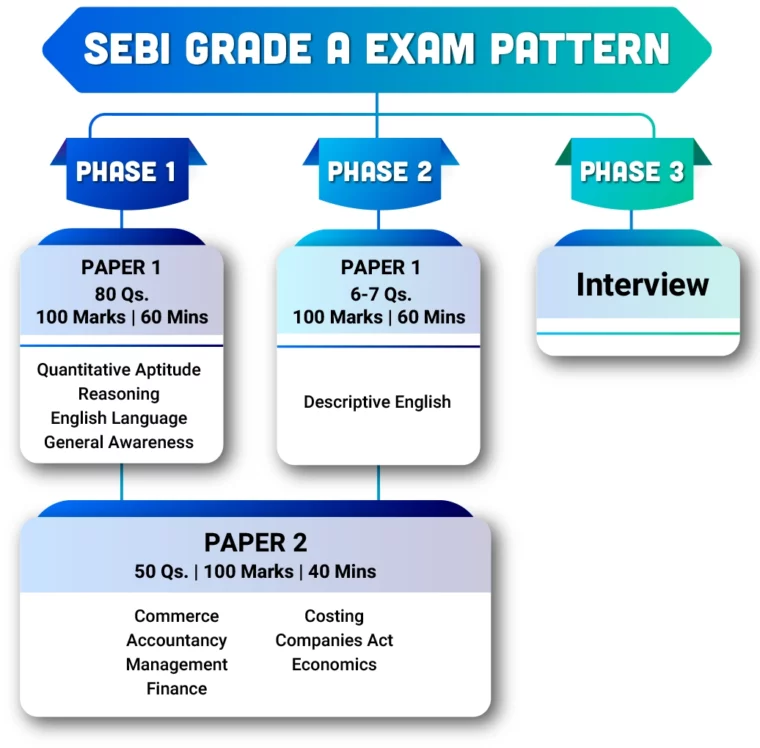
Important Note: The 2024 Phase 2 syllabus, exam pattern, and question format are subject to change at the discretion of SEBI as per the detailed recruitment notification to be released on 13 April 2024.
Conclusion
Preparing for the SEBI Grade A exam requires a comprehensive understanding of the exam pattern, subject-wise weightage, and an in-depth analysis of the previous year’s question papers (PYQs). By analysing PYQs, you can identify frequently asked topics, assess the difficulty level, and develop effective time management strategies.
Utilise the resources provided in this article to download solved PYQs for both Phase 1 and Phase 2 of the SEBI Grade A exam. With dedicated preparation and a focused strategy, you can increase your chances of success and secure a coveted position as SEBI Grade A Officer.
FAQs
Solving PYQs is an essential part of your preparation strategy for the SEBI Grade A exam. PYQs provide valuable insights into the types of questions asked, the difficulty level, the exam pattern, and the subject-topic weightage. By practising with PYQs, you can identify frequently asked topics, assess your strengths and weaknesses, and develop preparation strategies.
EduTap provides free access to solved PYQs for both Phase 1 and Phase 2 of the SEBI Grade A exam. The links in this article are categorised by year for both phases, making it easy to find the PYQs you need.
To identify important topics for the SEBI Grade A exam, pay attention to the frequency of questions asked from particular topics. You can also refer to the subject-wise weightage analysis provided in the article to understand the relative importance of each subject.
The difficulty level of the SEBI Grade A exam varies from year to year. However, based on the analysis of previous year’s question papers, the majority of questions fall under the easy to moderate category.
